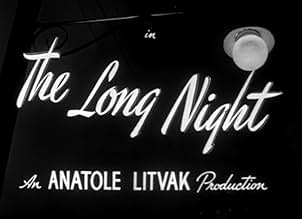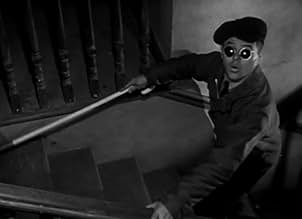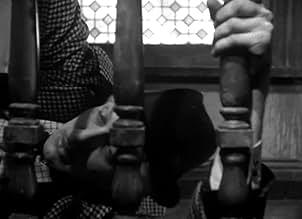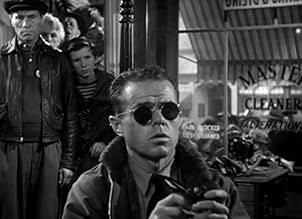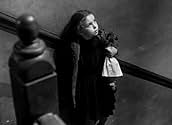IMDb RATING
6.5/10
2.3K
YOUR RATING
Police surround the apartment of apparent murderer Joe Adams, who refuses to surrender although escape appears impossible. During the siege, Joe reflects on the circumstances that led him to... Read allPolice surround the apartment of apparent murderer Joe Adams, who refuses to surrender although escape appears impossible. During the siege, Joe reflects on the circumstances that led him to this situation.Police surround the apartment of apparent murderer Joe Adams, who refuses to surrender although escape appears impossible. During the siege, Joe reflects on the circumstances that led him to this situation.
- Awards
- 4 wins total
Melinda Byron
- Peggy
- (as Patty King)
Davis Roberts
- Freddie
- (as Robert A. Davis)
Fred Aldrich
- Ticket Taker
- (uncredited)
Murray Alper
- Mac - Bartender
- (uncredited)
Bobby Barber
- Nightclub Patron
- (uncredited)
Vangie Beilby
- Audience Member
- (uncredited)
Brooks Benedict
- Audience Member
- (uncredited)
Gladys Blake
- Millie - Saloon Waitress
- (uncredited)
- Director
- Writers
- All cast & crew
- Production, box office & more at IMDbPro
6.52.3K
1
2
3
4
5
6
7
8
9
10
Featured reviews
Long, Dull Night
Holed up in his apartment after committing a murder, a depressed war veteran engages in a gun battle with the police while reflecting on the circumstances that led to the situation. It sounds intriguing on paper, but the script is rather sloppy, featuring flashbacks within flashbacks. It's basically an uninteresting story with dull characters. Fonda tries to make something of his role, but is given little to work with. Bel Geddes makes an impressive film debut, and Dvorak and Price are also fine, but they are all let down by the screenplay. Litvak has made better films, but here his staging of police work and the shootout is poorly executed.
Both interesting and underwhelming
Henry Fonda, Vincent Price and the film noir genre are reasons enough to see any film, and The Long Night did show a lot of promise. I didn't find that the The Long Night quite delivered enough, but it certainly has a lot of good things. It's very well made for starters, one of the most beautifully shot and visually atmospheric film noirs of the 1940s in my opinion. Dmitri Tiomkin's music is far from his best work with a lot of it sounding like re-arranged Beethoven(you decide whether you consider that a compliment, but it is very haunting and fits the film very well. But the high point of The Long Night was the acting. Henry Fonda gives an intelligently sensitive lead performance, and Barbara Bel Geddes- managing to look younger than she was- in her film debut is very touching as the love interest. Ann Dvorak is deliciously cynical, and Vincent Price is effortlessly ominous and smarmy as an utter sleaze-bag of a character(people will argue that he was at odds at the rest of the film but I rest the blame on the writing not Price). The Long Night does have faults though, the characters are not fleshed out enough to make me care for them(I would have cared more for Joe if the "when he's in jeopardy" scenario had been made less emotionally hollow and senseless), while the script is of rather rambling quality with Bel Geddes' final speech particularly contrived-sounding. The Long Night also lacks momentum pace-wise- well the final twenty minutes picks up a bit but comes too late- and the constant switching back from past to present and vice versa is enough to cause confusion. There are even some ideas like with Joe and Charlene's involvement with one another that are shoehorned in but not explained satisfactorily. So in conclusion, interesting for the cast and how it was made, but with stronger script and story execution it would've been less underwhelming than it turned out to be. 6/10 Bethany Cox
...for its own sake...
I just have to say... It seems as though every negative comment about this film starts out with "this is a bad REMAKE of..." Surely, I suppose it's nearly impossible to view THE LONG NIGHT as itself when you have already seen Marcel Carne's 1939 flick (and maybe even harder if you have created within yourself a dedication to anything foreign, slightly obscure, or non-Hollywood). The great thing about this movie, if one can get over the remake aspect of it, is that it is truly LOADED with great things! The set design and artwork are fantastic! Tiomkin's music is, once again, a fine creation! Polito's cinematography, camera work, and use of light are brilliant! Sure, the great story is, for the most part, taken from somewhere else, but the screenplay by the great John Wexley is excellent. I might be reading a bit to much into this, but I saw working class heroism, touches of popular justice, and just a hint of bourgeois deceit. The latter showed in the fantastic performance by Vincent Price as his character continued to try to sell a fantasy to Jo Ann (Barbara Bel Geddes) by means of magic and falsehood. All in all, I think this one is just like any good work of art: if you put a little into it, you can get a lot out of it.
9tavm
The Long Night is a nearly excellent, if obscure, movie I recently discovered
When I went to my local library to check some DVDs, I stumbled onto this obscure flick that starred Henry Fonda, Barbara Bel Geddes (in her film debut), Vincent Price, and Ann Dvorak. With that cast (I just remembered that Elisa Cook, Jr. has a memorable role as a blind man here), with Anatole Litvak as director, and Dimitri Tiomkin conducting his score (as well as some Beethoven pieces spread among it), I expected an excellent suspenseful movie and I got it! Well, maybe nearly so since the speech Ms. Bel Geddes says to Fonda at the end is obviously contrived to address the audience as well as the leading character about the faith of people. Otherwise, the dialogue was mostly spot-on especially the heated exchanges between Fonda and Price who, as usual, is absolutely charming even in his creepiness. And Ms. Dvorak marks a nice contrast with her cynicism as compared with Ms. Bel Geddes' optimism. Fonda himself goes the full range of emotions whether during the flashbacks or his present condition of being holed up in his apartment while the police are waiting outside. So for all that, I highly recommend The Long Night.
Partially successful noir
Henry Fonda goes through "The Long Night" after committing murder in this 1947 film noir directed by Anatole Litvak and also starring Vincent Price, Ann Dvorak and Barbara Bel Geddes. Fonda plays Joe, a returning veteran, now a blue collar worker who falls in love with young, pretty fellow orphan Jo Ann (Bel Geddes), only to come up against Price. Price plays Maximilian, a creepy magician with a show that features dogs and Charlene (Ann Dvorak). At first, Maximilian asks Joe to stay away from Charlene because she's his long-lost daughter and he wants better for her. From Charlene, Joe learns the truth - Maximilian is not her father, and she's attracted to his worldliness - though she claims to love Joe. Depressed, he turns to the sexy Charlene, his heart still with Jo Ann. During a fight in his apartment, he shoots Maximilian, and spends the entire movie under siege in his apartment as he relives in flashback and flashback within flashback what led him to this moment.
Litvak, a talented director, stages this film in an interesting manner - it begins with a blind man (Elisha Cook Jr.) stumbling across the body of Maximilian in the hallway of the apartment building where he lives. Joe will not leave his room, and the police work throughout the film to get him out. The photography and direction capture the darkness and drabness of Joe's surroundings, the cheapness of the nightclub where Maximilian performs, and focuses a harsh light on Charlene's room and Charlene herself.
Despite all of this great style, the film has a cheesy quality; the characters aren't really likable except for poor Joe; and the motivations of the characters aren't fully fleshed out, so the story ultimately doesn't make it. The acting is very good - Fonda shows us some still waters that run pretty deep in an excellently crafted performance. He's sexy as all get-out, too, when he lays down on Charlene's bed and smiles. Dvorak does a great job as a brittle Charlene, and Price is a complete sleazebag as the cruel Maximilian. Bel Geddes is incredibly young - this is her first film, and though she was 24 or 25, she looks and acts about 18, which is appropriate for this small-town, inexperienced girl.
"The Long Night" has some interesting elements, but because of a spotty script, we're not invested enough in the film for it to be really intriguing or exciting.
Litvak, a talented director, stages this film in an interesting manner - it begins with a blind man (Elisha Cook Jr.) stumbling across the body of Maximilian in the hallway of the apartment building where he lives. Joe will not leave his room, and the police work throughout the film to get him out. The photography and direction capture the darkness and drabness of Joe's surroundings, the cheapness of the nightclub where Maximilian performs, and focuses a harsh light on Charlene's room and Charlene herself.
Despite all of this great style, the film has a cheesy quality; the characters aren't really likable except for poor Joe; and the motivations of the characters aren't fully fleshed out, so the story ultimately doesn't make it. The acting is very good - Fonda shows us some still waters that run pretty deep in an excellently crafted performance. He's sexy as all get-out, too, when he lays down on Charlene's bed and smiles. Dvorak does a great job as a brittle Charlene, and Price is a complete sleazebag as the cruel Maximilian. Bel Geddes is incredibly young - this is her first film, and though she was 24 or 25, she looks and acts about 18, which is appropriate for this small-town, inexperienced girl.
"The Long Night" has some interesting elements, but because of a spotty script, we're not invested enough in the film for it to be really intriguing or exciting.
Did you know
- TriviaFilm debut of Barbara Bel Geddes. She was signed to a seven-year contract with RKO after this film. Director Anatole Litvak cast her after seeing her on Broadway as the female lead in "Deep Are the Roots", which played at the Fulton Theatre for 477 performances beginning 26 September 1945.
- GoofsWhen Joe from inside his apartment shoots at the cops who are standing outside his door; it leaves bullet holes in the door. But on a following cut after speaking with the little girl and going back into his apartment; there are no bullet holes on the interior side of the door.
- Quotes
Maximilian: [to Jo-Ann] You have sharp nails like a little animal. Maybe that's what I like about you.
- Crazy creditsOpening card: "...the night is long That never finds the day..." William Shakespeare, Macbeth, Act IV, Scene III
- ConnectionsFeatured in Henry Fonda: The Man and His Movies (1982)
- How long is The Long Night?Powered by Alexa
Details
- Release date
- Country of origin
- Language
- Also known as
- A Time to Kill
- Filming locations
- Youngstown, Ohio, USA(archive footage)
- Production company
- See more company credits at IMDbPro
Box office
- Gross US & Canada
- $1,000,000
- Runtime
- 1h 41m(101 min)
- Color
- Aspect ratio
- 1.37 : 1
Contribute to this page
Suggest an edit or add missing content


